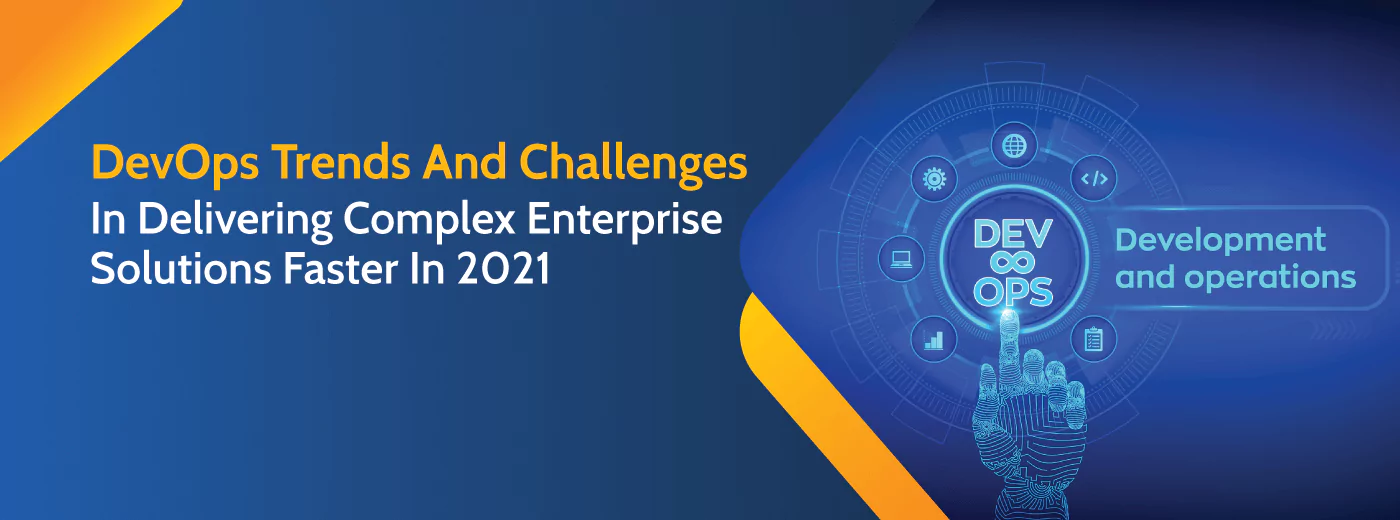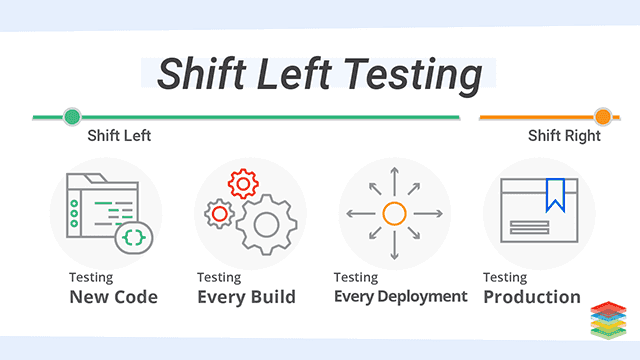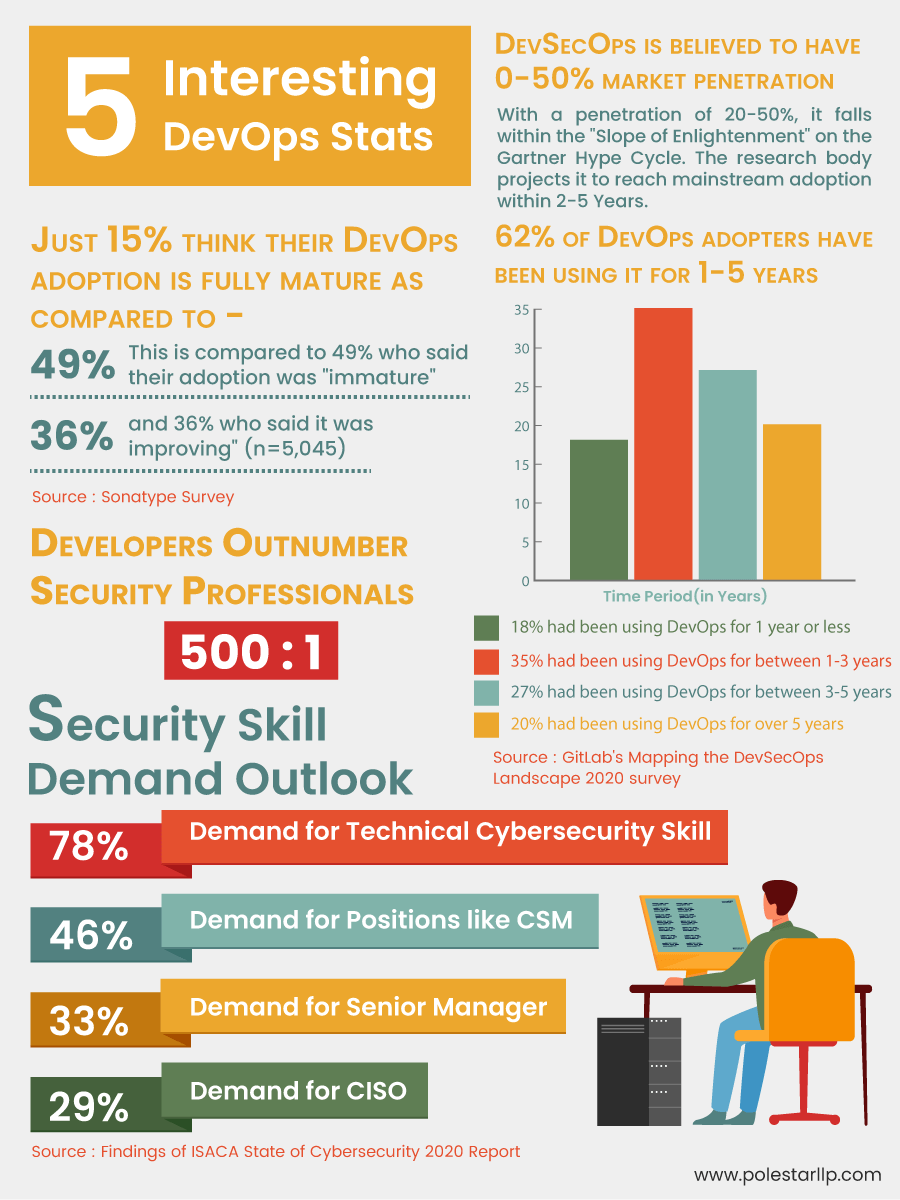
Sign up to receive latest insights & updates in technology, AI & data analytics, data science, & innovations from Polestar Analytics.
DevOps is a methodology that focuses on bringing together the Development, Operations, Testing, and Security teams to deliver innovative enterprise solutions faster. It has gained prominence in the past decade and the extent is evident with its adoption by the likes of - Google, Amazon, Netflix, Walmart, and many more.
So, The Question Arises Why DevOps, Why Has It Gained Such Prominence?
Well, it solves one of the biggest problems that has been overlooked in the product development exercise for decades - software development teams having a thorough understanding of the requirement and taking ownership of the product even after delivery.
In a way, it is as revolutionary as the ‘Agile’ but with more scope for innovation. To put things into perspective - Agile makes collaboration easier between the Customer or the Client wherein the feedback is flowing in constantly and changes are made accordingly - a shift left approach.
Whereas DevOps focuses on forming a team that comprises Development & Operations Professionals so that the changes are minimal as they are involved right from ideation till delivery and support. Hence a possibility for a shift left as well as the shift right approach.

Source: Xenostack
The difference between the ‘Shift Left’ and ‘Shift Right’ approaches can be better understood from this table that highlights the key objectives with both of them. Although the goal is common - to deliver better quality software, the approaches are literally the opposite.
Since being coined by Patrick Debois in 2009, DevOps has come a long way, seeing widespread adoption and drawing significant hype around the globe. Major technology vendors like Microsoft, AWS, Google, IBM/Red Hat, Atlassian and many others are offering end-to-end Continuous Integration (CI)/ Continuous Development (CD) Platforms.
Even after the growing popularity, the DevOps methodology is still in the early stages of mainstream adoption, falling between 20-50% within the "Slope of Enlightenment" on the Gartner Hype Cycle for Agile and DevOps, 2020. It is pegged to reach mainstream adoption in the next 2-5 years.
This infographic sums up the DevOps Trends:

As perfectly summarised by Jared Murrell, Director of DevOps, engineering & communities of practice at Github, “There isn't one way to do DevOps. It's not simple to quickly and perfectly 'do DevOps.' DevOps is defined by the people building software and how they work together. Naturally, there are some hurdles to overcome."
DevOps is a set of principles and techniques to eliminate the friction between the different teams involved and foster Innovation, collaboration and Ownership.
Challenge 1: Lacking Infrastructure Leading To Data Silos And Bottlenecks
DevOps teams work at the intersection of multiple disciplines, they should have access to rich, real-time data to work on the problems and introduce features in their tools. But, very often, it has been found that the necessary standards and protocols are not defined, leading to data silos, data duplication and incomplete information challenges.
Trend 1: Defined Data Governance & Security Protocols
Over the years, some leading DevOps leaders are suggesting a more cohesive cross-functional DevOps team. So the futuristic DevOps teams are required to take ownership of governance and security protocols to break down the silos as well as to avoid risking the enterprise-level data. And this is giving rise to teams like ‘DevSecOps’. It brings a lot of ownership and clarity to DevOps teams roles and expectations.
Challenge 2: Manual Change Management & Test Practices Frustrating Devs
Like any other IT associated projects, change management is one of the issues that claws its way into DevOps projects as well. The manual change management practices are typically associated with tedious approval processes and red-tapism lead to the loss of key traits experts associate with DevOps - ‘Speed’ and ‘Efficiency’. Most of the DevOps practitioners suggest automation but the upfront investment required, throws organizations off the track. On the software quality assurance (SQA) side, DevOps teams lack the proficiency to automate the test cases.
Trend 2: Automation
As per Jared Murrell, “Automation is a huge part of successful DevOps, but teams need to determine what is beneficial to automate, and where to start.” It requires streamlining the mundane change request approvals and writing complex test automation codes and macros to facilitate CI/CD. Going forward we might find more ‘DevTestOps’ teams to expedite automation.
Challenge 3: Adoption Of Point Solutions Across Teams
Different teams across the enterprise are using different tools for build deployment, automation, version control, testing, document sharing etc. It has primarily popped-up due to the growing emergence of cloud and microservices adoption. It slows the overall process down and evidently gives rise to siloed and inconsistent practices. such an approach hinders collaboration, making important resources inaccessible and unorganized - this creates a dependency on co-workers, mostly the IT team and overburdens them in the processes.
Trend 3: Emergence Of DevOps Management Platforms & Services
Leading technology vendors like AWS, Azure, Google and many others are offering a single platform to manage the entire DevOps workflow. It helps with developing & deploying the build faster and in significantly cutting down the chaos of managing and exploring multiple platforms. Additionally, these platforms offer the flexibility to set up on-premise or on cloud data warehouses to transform your business processes.
Challenge 4: Sky-Rocketing Cloud-Spends Issues
Cloud spends are generally considered to be a complex issue in every area and DevOps teams are not untouched by it. On occasions, DevOps teams have been found guilty of missing out on some hidden costs (such as bandwidth cost) or a deviation from the estimate when the software gets deployed in the real environment.
Accelerate your cloud operations and workloads by minimizing costs, increase the efficiency and speed up the release management cycle with our DevOps consulting services
BOOK A SESSIONTrend 4: Flexible Cloud Provisioning With Modern Cloud Platforms
The modern cloud data warehouse platforms like Snowflake, Azure, GCP, and others go a step further in helping users make informed decisions (even custom billing dashboards) related to provisioning and offer flexibility to scale-up or down at any point or just pay for what you consume.
Challenge 5: Skill Gap For DevOps Engineering
As we have discussed throughout the article, there is an exceeding demand for DevOps teams to don multiple hats. Cyberspace is posing a number of challenges on the software development teams across practices and the developers are required to reskill themselves to keep up with the pace of innovation. Not having multi-disciplinary knowledge (Development, cybersecurity, and testing) could hamper the chances of unlocking the full potential with DevOps.
Trends 5: Outsource Or Emergence Of Generalist Skill Sets
Whether it’s due to growing threats to software security, defining governance frameworks or automating test cases, the DevOps teams would be required to take full ownership and accountability of the applications they develop. There is a growing generalist type of roles where the DevOps members bring in the know-how of disciplines other than their core competency. In organizations where there is a lack of talent, they find it easier to look for outside support and either outsource the complete setup or augment the teams with senior practitioners.
Our DevOps solutions help organizations to align with the goals, rapidly and reliably, producing high-quality software-based products and services.
BOOK A SESSIONDevOps is a concept that fosters collaboration and continuous improvement but the ultimate responsibility lies with the team members. It requires persistence and dedication on their part to trigger the improvement across processes.
Like any other human-related process, it demands strong leadership that guides as well as motivates teams to upskill and take accountability. In the end, a good balance between the people, processes and technology is the need of the hour to achieve the maximum out of DevOps implementations.
Going forward in the year 2021, we believe that the DevOps teams will move towards automation, upskilling to get a better grasp at cross-disciplinary activities which will pave the way for better and agile inter and intra-team collaboration.
About Author

Assistant Vice President
You can't hire somebody else to do your pushups for you.